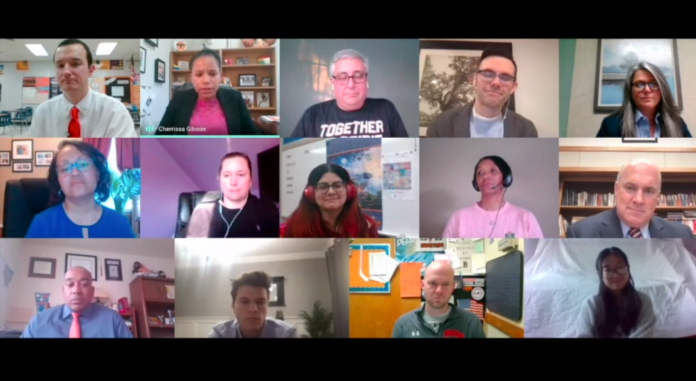Racism and social justice are currently at the heart of most conversations nationwide. A hot-button example surrounds The Bachelor franchise. Fans are demanding change and more minority representation after host Chris Harrison downplayed a contestant’s attendance at an Old South Ball plantation party in 2018.
Bachelor Nation wants the network to “do better,” and this push for culturally responsive practices is extending beyond Hollywood. In conjunction with Black History Month, staff, students and administrators of the Pennsbury School District participated in a deep discussion on how to work toward a safe, inclusive environment.
The virtual event was moderated by Dr. Cherrissa Gibson, Pennsbury’s Director of Equity, Diversity and Education. Grades K-12 submitted nearly 70 thought-provoking questions.
A major topic addressed was how to recognize, and ultimately prevent, racism in the classroom.
“In order for those students to be able to come to you, they have to see you as an ally. And the only way they can see you as an ally is if you consistently call out racism and call out classism and all those things,” said high school social studies teacher Angela Minor. “You call out microaggressions.”
Elementary school counselor Carmela Bunch defined the term “microaggression” as everyday put-downs that insult people of color, women and LGBTQ+ populations. These can be both intentional and unintentional. For example, the phrase, “She’s articulate for a Black person” may seem like a compliment to the individual saying it, but it’s really not.
Bunch said racial training must take place at all levels, from the administration to the cafeteria workers. She added that the curriculum needs a revamp to be more reflective of the entire student body.
“If people of color aren’t present in the room for the decisions being made, then nobody believes that the problem is urgent,” she said. “It’s really important to have representation in the room.”
The conversation shifted to the Jan. 6 Capitol attack, and how educators addressed the riots in the classroom. Elementary teacher Nicole Peirce was shocked to learn that all of her third-graders were aware of the events that unfolded. Peirce taught them about peaceful protests and conducted a spirited debate on whether there should be a playground or pool in the neighborhood.
“It’s something we definitely have to give a space for the children to be able to speak about how they’re feeling,” she said. “When you have a different voice than someone else, there are constructive ways in a democracy that you can share that voice, that you can raise your voice to what you believe and do it in a way that feels safe.”
Also discussed was whether or not politics – especially the recent election – should be brought up in the classroom. Gifted support teacher Matthew Kane said it should, as long as it’s done in a neutral way.
“It’s the charge of the teacher to bring up real-life topics that are facing society and be able to open a space that is safe and inclusive for variant opinions,” he said. “You know you did your job successfully if those kids walk out of your room not knowing how you personally feel about the topic.”
Minor begged to differ.
“We shouldn’t sacrifice truth for neutrality. You can’t be neutral on everything,” she said. “If there’s something that’s true and something that’s false, I’m not going to be neutral.”
Present during the conversation was high school student Amanda Lee, who shed light on the district’s lack of cultural inclusion in its curriculum. As an Asian student, she didn’t learn about the history of her heritage until the seventh grade.
Peirce, who has served on multiple curriculum committees, agreed that the district needs to take a hard look at what’s covered in the classroom.
“That renewal process might be years between when we select something and the next time that we choose new material,” she said. “The Pennsbury community has changed dramatically since the last time that happened. We need a more regular audit of materials, especially novels in classroom libraries.”
Minor echoed her sentiment, saying Pennsbury has a “top down” approach to the curriculum rather than a collaborative one. She asked, “Will high schoolers learn that the GI Bill was discriminatory toward Black soldiers? It depends on who their teacher is, and it shouldn’t.”
Middle school teacher Monica James called for the hiring of more minority staff members. James said she had her first African American teacher in the fourth grade, and having an instructor who looked like her made it the best year ever.
“To welcome students from different backgrounds, it’s so important to have a diverse staff,” she said.
At the end of the discussion, all participants were in agreement that forming an all-inclusive culture at Pennsbury will take time. But it’s possible if everyone’s willing to put in the work.
“We can’t begin to appreciate somebody else’s experiences until we start to have tough conversations, and if they’re uncomfortable, good,” said high school teacher Anthony Barth. “Growth comes from discomfort. Understanding springs from unease. These conversations are hard to have and they should be.”
Superintendent Dr. William Gretzula, who previously came under fire for using derogatory terms, said the discussion included many teachable moments.
“I continue to try to educate myself as a human and as a leader about the various perspectives on matters like social injustice, biases and the inequities that result from the presence of both,” he said. “It’s my hope that it makes me a better person.”
Samantha Bambino can be reached at [email protected]


